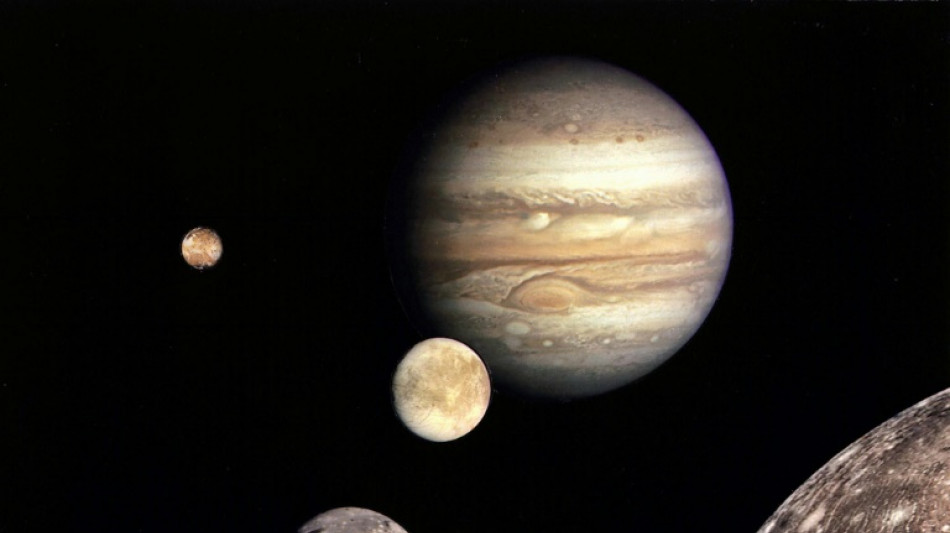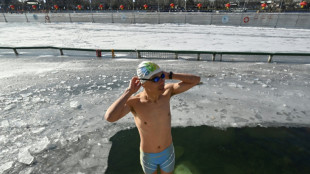
-
 Men's Fashion Week kicks off in Paris with tributes for Valentino
Men's Fashion Week kicks off in Paris with tributes for Valentino
-
Lake named as captain as Wales unveil Six Nations squad

-
 Royals visit deadly train crash site as Spain mourns
Royals visit deadly train crash site as Spain mourns
-
Police, pro-Kurd protesters clash at Turkey border with Syria

-
 Thai forces razed Cambodian homes on border: rights group
Thai forces razed Cambodian homes on border: rights group
-
Jellyfish-inspired Osaka battles into Australian Open round two

-
 Valentino taught us to respect women, says partner
Valentino taught us to respect women, says partner
-
Australia stiffens hate crime, gun laws after Bondi attack

-
 Mercedes chief designer Owen to leave F1 team
Mercedes chief designer Owen to leave F1 team
-
Trump unloads on allies as Davos showdown looms

-
 Moscow revels in Trump's Greenland plans but keeps concerns quiet
Moscow revels in Trump's Greenland plans but keeps concerns quiet
-
Global tourism hit new record level in 2025: UN

-
 Senegal poised to party with parade honouring AFCON champs
Senegal poised to party with parade honouring AFCON champs
-
Osaka emerges for Melbourne opener under hat, veil and parasol

-
 Dogsled diplomacy in Greenland proves elusive for US
Dogsled diplomacy in Greenland proves elusive for US
-
Almost half of Kyiv without heat, power, after Russian attack

-
 EU vows 'unflinching' response to Trump's Greenland gambit
EU vows 'unflinching' response to Trump's Greenland gambit
-
Osaka steals show at Australian Open as Sinner strolls through

-
 Brignone impresses in first run of Kronplatz giant slalom in World Cup comeback
Brignone impresses in first run of Kronplatz giant slalom in World Cup comeback
-
Osaka emerges for Melbourne opener under white hat and umbrella

-
 Malawi suffers as US aid cuts cripple healthcare
Malawi suffers as US aid cuts cripple healthcare
-
Bessent says Europe dumping US debt over Greenland would 'defy logic'

-
 Freeze, please! China's winter swimmers take the plunge
Freeze, please! China's winter swimmers take the plunge
-
Talks between Damascus, Kurdish-led forces 'collapse': Kurdish official to AFP

-
 In-form Bencic makes light work of Boulter at Australian Open
In-form Bencic makes light work of Boulter at Australian Open
-
Spain mourns as train disaster toll rises to 41

-
 Sinner into Melbourne round two as opponent retires hurt
Sinner into Melbourne round two as opponent retires hurt
-
Israel begins demolitions at UNRWA headquarters in east Jerusalem

-
 Almost half of Kyiv without heat, power, after Russian attack: govt
Almost half of Kyiv without heat, power, after Russian attack: govt
-
Veteran Monfils exits to standing ovation on Australian Open farewell

-
 Precision-serving former finalist Rybakina powers on in Melbourne
Precision-serving former finalist Rybakina powers on in Melbourne
-
South Korea's women footballers threaten boycott over conditions

-
 Equities sink, gold and silver hit records as Greenland fears mount
Equities sink, gold and silver hit records as Greenland fears mount
-
Australian lawmakers back stricter gun, hate crime laws

-
 EU wants to keep Chinese suppliers out of critical infrastructure
EU wants to keep Chinese suppliers out of critical infrastructure
-
AI reshaping the battle over the narrative of Maduro's US capture

-
 Penguins bring forward breeding season as Antarctica warms: study
Penguins bring forward breeding season as Antarctica warms: study
-
Vietnam leader pledges graft fight as he eyes China-style powers

-
 Ukrainian makes soldier dad's 'dream come true' at Australian Open
Ukrainian makes soldier dad's 'dream come true' at Australian Open
-
'Timid' Keys makes shaky start to Australian Open title defence

-
 Indiana crowned college champions to complete fairytale season
Indiana crowned college champions to complete fairytale season
-
South Koreans go cuckoo for 'Dubai-style' cookies

-
 Harris leads Pistons past Celtics in thriller; Thunder bounce back
Harris leads Pistons past Celtics in thriller; Thunder bounce back
-
Tjen first Indonesian to win at Australian Open in 28 years

-
 Long-delayed decision due on Chinese mega-embassy in London
Long-delayed decision due on Chinese mega-embassy in London
-
Djokovic jokes that he wants slice of Alcaraz's winnings

-
 Trump tariff threat 'poison' for Germany's fragile recovery
Trump tariff threat 'poison' for Germany's fragile recovery
-
Tourists hit record in Japan, despite plunge from China

-
 Jittery Keys opens Melbourne defence as Sinner begins hat-trick quest
Jittery Keys opens Melbourne defence as Sinner begins hat-trick quest
-
The impact of Trump's foreign aid cuts, one year on


Search for alien life extends to Jupiter's icy moons
Could vast, long-hidden oceans be teeming with alien life in our very own Solar System?
A new chapter in humanity's search for extraterrestrial life opens on Thursday as Europe's JUICE spacecraft blasts off on a mission to investigate the icy moons of Jupiter.
First discovered by Italian astronomer Galileo Galilei more than 400 years ago, these ice-covered moons are so far from the Sun that they were long dismissed as possible candidates to host life in our backyard.
Until recently, the Solar System's habitable zone was thought to "end at Mars", French astrophysicist Athena Coustenis, one of the scientific leads of the European Space Agency (ESA)'s JUICE mission, told AFP.
But NASA's Galileo probe to Jupiter in 1995 and the more recent Cassini spacecraft's trip to Saturn caused scientists to broaden their horizons.
The gas giant planets themselves were correctly ruled out, but their icy moons -- particularly Jupiter's Europa and Ganymede, and Saturn's Enceladus and Titan -- offered fresh hope of nearby life.
Under their icy surfaces are thought to be huge oceans of liquid water -- a crucial ingredient for life as we know it.
Nicolas Altobelli, a JUICE project scientist at ESA, said it would be "the first time that we explore habitats beyond the frost line" between Mars and Jupiter.
Beyond that line, temperatures plummet and "liquid water can no longer exist on the surface", Altobelli told AFP earlier this year.
- 'Gigantic' ocean -
The Jupiter Icy Moons Explorer (JUICE) mission launches from Europe's spaceport in Kourou, French Guiana on Thursday on an eight-year odyssey through space.
By July 2031 it will have entered Jupiter's orbit, from which it will probe Ganymede, Europa and fellow icy moon Callisto.
Then, in 2034, JUICE will enter the orbit of Ganymede, the first time a spacecraft has done so around a moon other than our own.
As well as being the largest moon in the Solar System, Ganymede is also the only one that has its own magnetic field, which protects it from dangerous radiation.
This is just one of several signs that Ganymede's hidden ocean could provide a stable environment for life.
Unlike similar missions to Mars, which focus on finding signs of ancient life long since extinguished, scientists hope Jupiter's icy moons will still be home to living organisms, even if only tiny or single-celled.
Such habitability requires a power source. Lacking energy from the Sun, the moons could instead take advantage of the gravity that Jupiter exerts on its satellites.
The force creates a process called tidal heating, which warms the interior of the moons and keeps their water liquid.
Ganymede's "gigantic" liquid ocean is trapped between two thick layers of ice dozens of kilometres beneath the surface, said Carole Larigauderie, JUICE project head at French space agency CNES.
"On Earth, we still find life forms at the bottom of the abyss," she added.
Tiny microbes such as bacteria and archaea have been found to be able to survive on Earth without sunlight, raising hopes that life elsewhere will be able to do the same.
As well as water and energy, life needs nutrients.
"The big question is therefore whether Ganymede's ocean contains" the necessary chemical elements, Coustenis said.
The ocean would need to be able to absorb the nutrients from anything that fell on the moon's surface, for example, which would eventually dissolve into the water, she added.
- Not alone -
JUICE's array of instruments will probe Ganymede's ocean to determine its depth, distance from the surface and -- hopefully -- its composition.
The ESA's 1.6 billion euro ($1.7 billion) probe will spend eight months orbiting Ganymede, getting as close as 200 kilometres (125 miles) from the moon, all while sheltered from radiation.
It will not be the only spacecraft lurking around Jupiter.
NASA's Europa Clipper mission is scheduled to launch in October next year. It will take a quicker path to Jupiter, arriving at Europa in 2030.
If one -- or more -- of Jupiter's moons ticks all the boxes to host life, the "logical next step" would be to send a mission to land on the surface, said Cyril Cavel, JUICE project manager at manufacturer Airbus.
Although there are no plans for such a mission, which could definitively prove the existence of life outside of Earth, "that's part of the dream," he said.
F.Pavlenko--BTB



